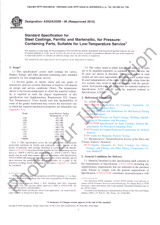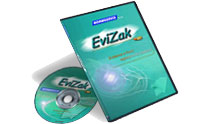Wir benötigen Ihre Einwilligung zur Verwendung der einzelnen Daten, damit Sie unter anderem Informationen zu Ihren Interessen einsehen können. Klicken Sie auf "OK", um Ihre Zustimmung zu erteilen.
ASTM E21-20
Standard Test Methods for Elevated Temperature Tension Tests of Metallic Materials
Name übersetzen
NORM herausgegeben am 1.9.2020
Informationen über die Norm:
Bezeichnung normen: ASTM E21-20
Ausgabedatum normen: 1.9.2020
SKU: NS-1006543
Zahl der Seiten: 9
Gewicht ca.: 27 g (0.06 Pfund)
Land: Amerikanische technische Norm
Kategorie: Technische Normen ASTM
Kategorie - ähnliche Normen:
Die Annotation des Normtextes ASTM E21-20 :
Keywords:
elevated temperature, elongation, reduction of area, strain rate, tensile strength, yield strength,, ICS Number Code 77.040.10 (Mechanical testing of metals)
Ergänzende Informationen
| Significance and Use | ||||||||||||||||||||
|
4.1 The elevated-temperature tension test gives a useful estimate of the ability of metals to withstand the application of applied tensile forces. Using established and conventional relationships it can be used to give some indication of probable behavior under other simple states of stress, such as compression, shear, etc. The ductility values give a comparative measure of the capacity of different materials to deform locally without cracking and thus to accommodate a local stress concentration or overstress; however, quantitative relationships between tensile ductility and the effect of stress concentrations at elevated temperature are not universally valid. A similar comparative relationship exists between tensile ductility and strain-controlled, low-cycle fatigue life under simple states of stress. The results of these tension tests can be considered as only a questionable comparative measure of the strength and ductility for service times of many hours. Therefore, the principal usefulness of the elevated-temperature tension test is to assure that the tested material is similar to reference material when other measures such as chemical composition and microstructure also show the two materials are similar. |
||||||||||||||||||||
| 1. Scope | ||||||||||||||||||||
|
1.1 These test methods cover procedure and equipment for the determination of tensile strength, yield strength, elongation, and reduction of area of metallic materials at elevated temperatures. 1.2 Determination of modulus of elasticity and proportional limit are not included. 1.3 Tension tests under conditions of rapid heating or rapid strain rates are not included. 1.4 The values stated in inch-pound units are to be regarded as standard. The values given in parentheses are mathematical conversions to SI units that are provided for information only and are not considered standard. 1.5 This standard does not purport to address all of the safety concerns, if any, associated with its use. It is the responsibility of the user of this standard to establish appropriate safety, health, and environmental practices and determine the applicability of regulatory limitations prior to use. 1.6 This international standard was developed in accordance with internationally recognized principles on standardization established in the Decision on Principles for the Development of International Standards, Guides and Recommendations issued by the World Trade Organization Technical Barriers to Trade (TBT) Committee. |
||||||||||||||||||||
| 2. Referenced Documents | ||||||||||||||||||||
|
Empfehlungen:
EEviZak – alle Gesetze einschließlich ihrer Evidenz in einer Stelle
Bereitstellung von aktuellen Informationen über legislative Vorschriften in der Sammlung der Gesetze bis zum Jahr 1945.
Aktualisierung 2x pro Monat!
Brauchen Sie mehr Informationen? Sehen Sie sich diese Seite an.




 Cookies
Cookies
